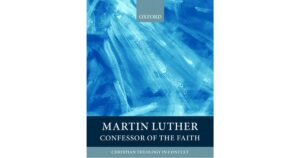The following is from David P. Scaer, Law and Gospel and the Means of Grace, pp. 4-5 (The Luther Academy: St. Louis, 2008).
According to a confessional Lutheran understanding, the law lays down God’s requirements or regulations in such a way that sinful people by themselves cannot fulfill them. Those who understand the law’s message in this way are aware they face eternal death for which there is no relief. Such preaching of the law leads them to repent of their sins with sorrow and contrition. In what appears to be a contradiction God offers in the gospel the sweet hope of salvation in Jesus Christ. The gospel creates faith, which in turn lays hold of Christ who is present in this proclamation, and by this faith the believer accepts the promises of eternal bliss with Him. Law and gospel are as complementary as they are dissonant. To use Fagerberg’s words, ‘Both cooperation and tension are found to exist between law and gospel.’ Preaching the law without the gospel leads to despair and hopelessness. Without the prior proclamation of the law, the gospel cannot be appreciated or its terms understood, and therefore cannot accomplish its intended purpose. However, their mutual dependence on each other does not erase their contradictory messages, namely, that what one demands the other gives. Law confronts human beings in the condition of their sins and alienation from God, and gospel offers a completed salvation in Jesus Christ. Both are equally valid words of God, which when preached in tandem make Christians aware that they are sinners and God’s redeemed children at the same time. This is known in Lutheran theology as the simul iustus et peccator, “at the same time justified and sinner.” Only death relieves Christians from the agonizing contradiction that they find within themselves. In the same moment they are condemned by the law and forgiven by the gospel. Since the law and the gospel penetrate our inner being and uncover who and what we really are, no other Christian doctrine is as existential as this one. By it we learn not only about the God who condemns and saves, but about ourselves as accountable to God and still redeemed by Him. In addition it sets the terms for how all articles of the Christian faith are to be preached and believed.
From this we glean that, in the theological meanings of the words “law” and “gospel”, we are confronted by:
- two equally valid words of God
- two words that are
- contradictory, disonant, in tension
- complementary, mutually dependent, cooperating
- law
- undoable
- condemnation
- death without relief
- exposure
- sinners
- gospel
- gift (what the law demands, the gospel gives)
- hope of salvation
- faith created by God acting in his word, not by any power of ours
- eternal bliss with God
- saints
So on this side of the grave we are sinner-saints, continually in existential tension under the two words, and understanding all other words in the light of these two words.




![Read more about the article Jesus Received Up — Luke 9:51-56 [62]](https://trhalvorson.com/wp-content/uploads/2022/06/Ark-of-the-Covenant-300x158.jpg)